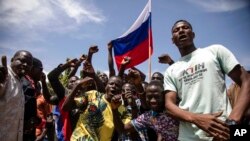This website uses cookies so that we can provide you with the best user experience possible. Cookie information is stored in your browser and performs functions such as recognising you when you return to our website and helping our team to understand which sections of the website you find most interesting and useful.

Burkina Faso's army captain, Ibrahim Traore, announced Friday evening that the army had seized power and ousted military leader Paul Henri Damiba, who himself had taken power in a coup only eight months ago.
Traore said in a statement that a group of officers who helped Damiba seize power in January had decided that the leader was no longer able to secure the country, which has been battling a mounting Islamic insurgency.
The statement signed by Traore was read on state television late Friday by another military officer.
"Faced with the deteriorating situation, we tried several times to get Damiba to refocus the transition on the security question," Traore's statement said.
When Damiba came to power in January, after ousting President Roch Kabore, he had promised to make the country more secure. However, violence in the country has continued, and political tensions have grown in recent months.
Damiba had just returned from addressing the U.N. General Assembly in New York.
The country's new military leaders said they were dissolving the national assembly. They also announced that Burkina Faso's borders had been closed and that a curfew would be in effect from 9 p.m. to 5 a.m.
Before Friday evening's announcement, troops in Burkina Faso had blocked streets in the capital, Ouagadougou, and state TV had stopped broadcasting.
At around 4:30 a.m. Friday, gunfire and a loud explosion were reported in Ouagadougou, in the vicinity of Camp Baba Sy, where Damiba is based. Witnesses said gunfire could also be heard coming from Kosyam, where the presidential palace is located.
A reporter for VOA who went to the capital's city center Friday found a military blockade on Boulevard Charles de Gaulle. Many military members were wearing face masks and were reluctant to talk, while local police said they had no idea what was happening.
Just after 12 p.m. local time, the president's office released a statement on Facebook, part of which said, "In view of the confused situation created as a result of a movement of mood by some elements of the national armed forces this Friday ... negotiations are underway to bring back calm and serenity."
The U.S. Embassy warned Americans to limit their movements and stay informed of local media reports.
The events Friday came after rising frustration with the government's inability to deal with insecurity caused by militant groups linked to al-Qaida and Islamic State.
On Monday, a convoy carrying food and basic supplies to the northern town of Djibo, which has been under siege by militants for years, was ambushed. Eleven soldiers were killed, and more than 50 civilians were said to be missing.
The incident raised serious concerns about the government, with many citizens expressing their fears and doubts on social media.
Paul Melly, an analyst for Chatham House, a London-based think tank, said, "Burkinabe feel afraid about the continuing spread of jihadist violence."
Henry Wilkins in Ouagadougou, Burkina Faso, contributed to this report, which also includes information from The Associated Press and Reuters.



 Africana55 Radio
Africana55 Radio 

